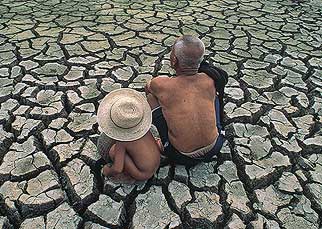 |

In November 2000, world leaders met at a big conference in The Hague, Holland to discuss the problem of climate change. Many scientists believe that the world's climate is changing faster than at any other time in the last 10,000 years. They blame the build-up of a group of gases like CO2. These come from natural sources such as volcanoes, and also from human sources like power stations and cars. These gases act like a blanket, stopping the sun's heat from escaping into outer space and making temperatures rise on earth. This 'global warming' may cause more violent and unpredictable weather in the future, such as long droughts, vicious hurricanes and floods. As new records are set in extreme weather events, it is nearly always the poorest countries that suffer the most, even though they add the smallest amount of these gases. Sadly, world leaders could not reach an agreement in The Hague. Even though European countries agreed that cuts in CO2 were necessary, a group of rich countries, led by the USA, would not agree to cutting their release of CO2. The USA has only 4% of the world's population but they produce a quarter of the world's CO2, but the Americans argue that cuts in CO2 would cost them a lot of money and change their lifestyle. To find out more about the causes and effects of global warming, and what you can do to help, check out these websites: www.schools.detr.gov.uk/global
Children and adults in many countries cannot get hold of interesting, up-to-date books and magazines that help people to learn and read. To help with this, Book Aid International supplies more than 750,000 books a year to more than 60 countries. Book Aid International works with local libraries and community groups that are finding practical ways to make books and information available to those that need them most. Book Aid International is also the official charity of 'World Book Day', a worldwide celebration of books and reading that is taking place on 1st March 2001. To find out more about how you and your school can support Book Aid International and take part in World Book Day, check out their website, www.bookaid.org or contact them at: 39-41, Coldharbour Lane,
At the beginning of December 2000, thousands of people marched in London to mark the end of Jubilee 2000, the organisation that campaigned to cancel the debts owed by the world's poorest countries. Poor countries borrow money from banks and governments so they can build roads, dams, schools and hospitals. But these countries have to pay an extra charge called interest on the money they have borrowed. As they cannot pay back their debts, the extra interest payments make their debts grow bigger and bigger. African countries now pay about �140 million every week in debt repayments which means they have less money to spend on health care and clean water. Jubilee 2000 believes that 7 million children die each year as a result. Jubilee 2000 has managed to persuade leaders of the world's richest countries to cancel the debt for some of the poorest countries, so they can spend money on health and other services instead and actually save lives. But the challenge is not over yet. There are still many poor countries that have to pay back debt which they cannot afford. As Jubilee 2000 ends, the 'Drop the Debt' campaign begins to keep up the pressure against debt. For more information on these two organisations, have a look at their websites with your teacher: |


